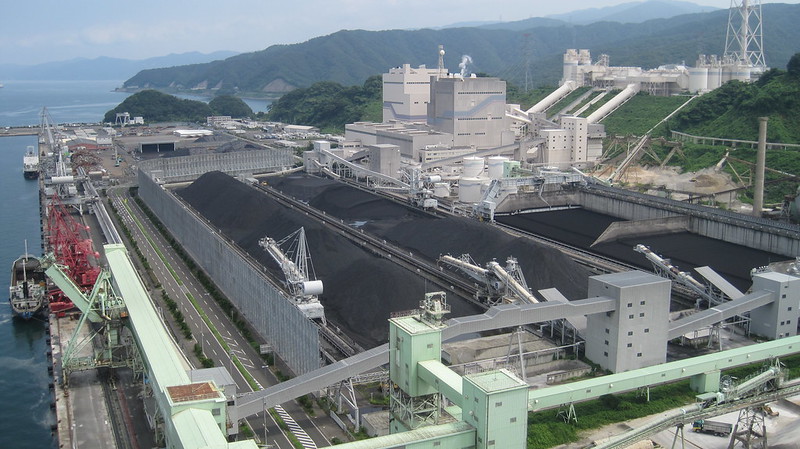In response to Russia’s invasion of Ukraine, Japan has reluctantly decided to join the other G7 countries in gradually banning imports of Russian coal.
Could this signal a break with Tokyo’s coal-friendly policies? That seems unlikely given its track record of using loopholes and greenwashing to circumvent global efforts to end coal. While other wealthy countries have slowly been transitioning away from coal, Japan has continued its support for coal power at home and abroad.
Japan is the second largest funder of coal power projects in other countries, after China. It justifies this funding by deceptively framing it as a contribution to climate change mitigation, arguing that Japanese coal technology is less polluting than conventional coal technology. The government therefore supports the export of Japanese “world-leading” coal power plants to developing countries. This policy is misleadingly described as “in line with the Paris Agreement and aimed at leading global decarbonization efforts”.
Strong international pushback has led to some positive developments. The Japan Bank for International Cooperation announced in 2020 that it “will no longer accept loan applications for coal-fired power generation projects” and some Japanese-funded projects have been cancelled. Nonetheless, a recent study found that the world’s three biggest lenders to the coal industry were all Japanese banks.
In June of 2021, G7 countries promised to make efforts to end coal “as soon as possible” and end “almost” all direct government support for the fossil fuel energy sector overseas. According to someone involved in preparing the G7 statement, it was mainly on Japan’s insistence that such enervating qualifiers were inserted, weakening the message and enabling prolonged coal use.
Japan’s Ministry of Economy Trade and Industry (METI) has stated that Japan intends to keep its coal plants but will try to “decrease the [coal] share as much as possible”. However, an unnamed METI official told the Asahi newspaper that compromising on the coal share of Japan’s energy mix was “out of the question”. This means the government has no intention to improve its unambitious Basic Energy Plan, which aims at a 19% coal share in the 2030 electricity mix.
At the G20 meeting in Rome last October, countries resolved to end “public finance for new unabated coal power generation abroad”. On this occasion, Japan declared its intention “to end new direct government support” for such projects. The Japanese wording is important as it leaves the door open to continue backing overseas coal projects through the Japan International Cooperation Agency (JICA). This is because JICA, due to its legal status as an independent administrative institution, is not technically a government agency even though it operates like one.
Last year’s Cop26 climate talks ended with the Glasgow Pact calling for a phasedown of unabated coal power and fossil fuel subsidies. Many participating countries signed the Global Coal to Clean Power Transition Declaration and a pledge to stop funding foreign fossil fuel projects. Japan signed neither.
Sweden set to be world’s first country to target consumption-based emission cuts
Japan’s new prime minister, Fumio Kishida, has been noncommittal on a coal phasedown. In his policy speeches and his Cop26 speech, he boasted about Japanese environmental leadership, but conspicuously avoided any mention of coal. His chief cabinet secretary, Hirokazu Matsuno, perfectly conveyed the government’s lack of ambition when he insisted that Japan’s plans are “in line” with the Cop26 agreement’s call for a phasedown of coal.
The government pins its hopes on “clean coal” technologies like carbon capture and storage to mitigate the climate impact of coal, but the feasibility of these is highly doubtful. A recent report by Transition Zero concluded that these technologies “are high-cost with limited carbon-reduction potential in the electricity sector”.
In short, Japan has consistently resorted to semantic acrobatics to extend the life of coal power.
Japan’s unrelenting coal addiction not only threatens to undercut its “lofty goal” of cutting greenhouse gas emissions by 50% by 2030, it also risks locking other Asian countries onto a similar trajectory of coal dependence.
As Japan now will begin banning Russian coal, it should not look for new coal partners, but rather use this moment as an opportunity to earnestly transition away from coal. It is high time for Tokyo to join global efforts to contain the climate crisis by reducing emissions in the electricity sector.
Florentine Koppenborg is a postdoctoral researcher and lecturer and the Bavarian School of Public Policy (HfP) at the Technical University of Munich. Ulv Hanssen is an associate professor at the Faculty of Law at Soka University and an associate research fellow at the Swedish Institute of International Affairs.
